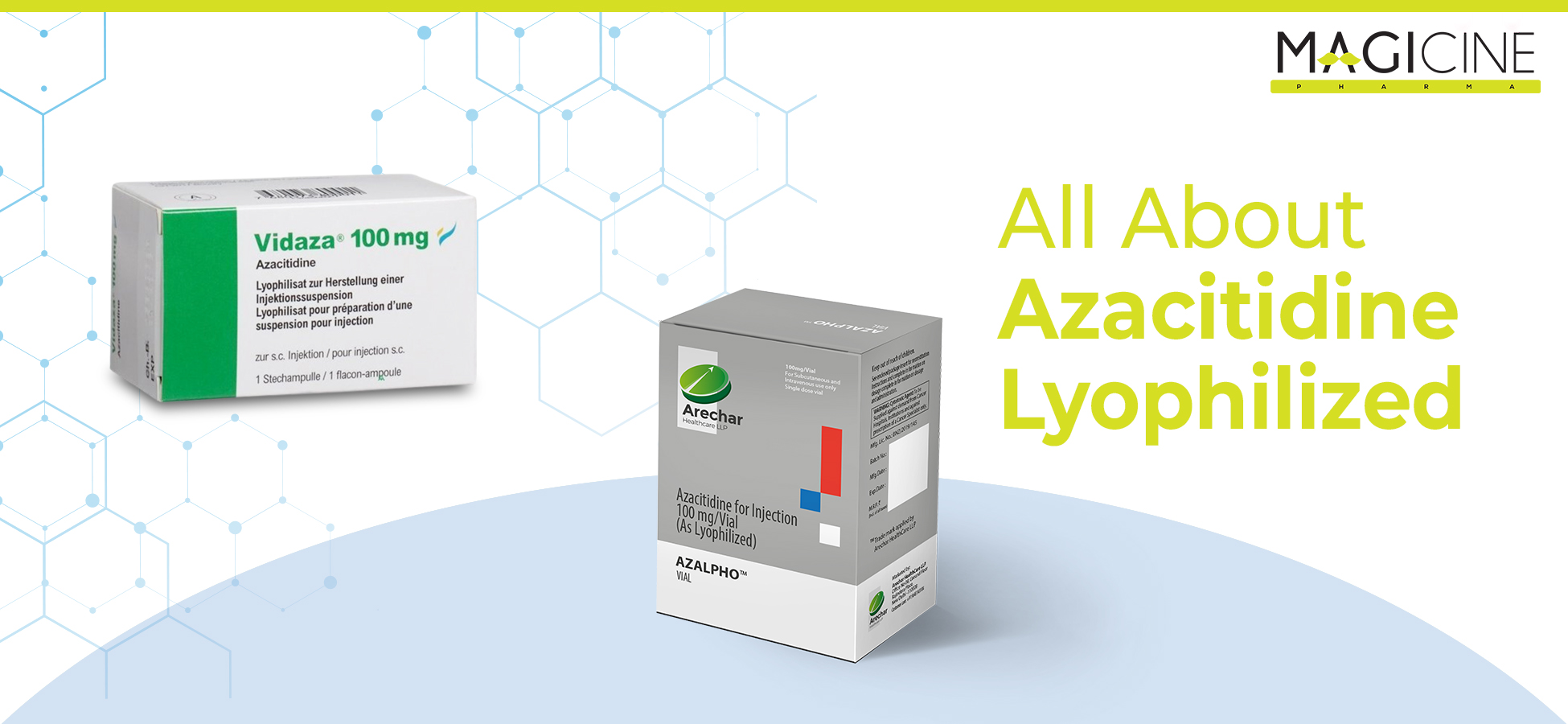
Azacitidine is an antimetabolite of cytidine used in the treatment of certain types of cancer. This drug is marketed as Vidaza and Azalpho among others. It is available in the dose strength of 100mg in the form of injections (vials).
FDA Approval History:
For Myelodysplastic Syndromes: May 19, 2004
Uses
Azacitidine is a pyrimidine nucleoside analogue and a DNA methyltransferase inhibitor that is used in the treatment of patients with Myelodysplastic Syndromes subtypes:
- Refractory anemia (RA) or refractory anemia with ringed sideroblasts (when accompanied by thrombocytopenia or neutropenia or requiring transfusions)
- Refractory anemia with excess blasts (RAEB)
- Chronic myelomonocytic leukemia (CMMoL)
Working
Since Azacitidine lyophilized is expected to exert antineoplastic effects, it inhibits the activity of a certain enzyme.
- STEP-1
DNA Methyltransferase: These enzymes serve a wide variety of biological functions. DNA methyltransferase inhibits gene transcription by blocking accessibility to transcriptional activators. - STEP-2
Azacitidine Enters: Azacitidine works by inducing antineoplastic activity and inhibiting DNA methyltransferase at low doses. Binding to DNA Methyltransferase covalently leads to the hypomethylation of DNA while preventing DNA synthesis. - STEP-3
Cell Death: This type of covalent binding results in the disassembly of polyribosomes, defective methylation, and acceptor function of transfer RNA. The inhibition of the production of protein further causes cell death.
Side Effects
Azacitidine lyophilized injection may show certain side effects during the therapy. To manage them, the doctor may already prescribe over-the-counter drugs. The following are common, rare, and injection-site reactions linked with the use of this medicine.
Injection-site reactions
- Skin rash
- Itching
- Swelling on the arms
- Pain in the injection site
Common side effects
- Nausea
- Fever
- Cough
- Chills
- Diarrhea
- Dizziness
- Vomiting
- Abdominal pain
- Blood in the stools
- Pale skin
- Unusual bleeding
- Loss of appetite
- Mouth sores or spots
- Bleeding gums
Rare side effects
- Difficulty in moving
- Chest discomfort
- Red spots on the arms
- Frequent sneezing
- Side pain
- Difficulty in breathing
- Muscle stiffness
- Lack of strength
- Constipation
- Bone marrow failure
- Dry skin
Warnings & Precautions
- Pregnancy
Azacitidine Lyophilized may result in severe harm to the unborn baby. Experts claim that this drug caused structural faults in animals during the trials. This is why doctors advise women to use effective birth control to avoid pregnancy during therapy. - Nursing
Experts aren’t sure whether this drug gets excreted through breast milk or not. To remain on the safer side, doctors advise women to avoid nursing during Azacitidine therapy. - Pediatric Use
It is not known whether this drug is safe for use in pediatric patients. The safety and efficacy have not yet been established in this age group. - Geriatric Use
The use of this drug in geriatric patients requires regular tests of renal function. That’s because older patients tend to have a decreased kidney function due to the use of medications. - Neutropenia and Anemia
Researchers link anemia and neutropenia with the use of this medicine. Thus, dose changes may be required after examining the blood cell count regularly during the treatment period. - Hepatic Impairment
During the clinical trials, patients having severe hepatic impairment were not included. Due to its hepatotoxic nature, Azacitidine is not recommended for use in patients with severe hepatic disease. - Renal Failure
This drug is primarily excreted through the kidneys. Azacitidine injection is thus not advised for use in patients with serious renal impairment. Plus, patients of this category were not included in the clinical trials.
Interactions
Because of complications caused by drug-drug or drug-disease interactions, the medical team asks for the patient's health history. This helps in avoiding potential interactions during the treatment period. Some patients may require dose changes for the same.
Interaction with medicines: Certain drugs are not recommended for concomitant use with Azacitidine. These may include adalimumab, infliximab, baricitinib, etanercept, leflunomide, tofacitinib, ozanimod, ponesimod, voclosporin, and thalidomide. To avoid potential interactions & complications, the doctor may suggest dose reductions.
Interaction with diseases: Azacitidine is expected to interact with the following diseases. In severe cases, patients suffering from other diseases may not be prescribed this drug. However, moderate cases may be resolved by dose revisions.
- Hepatic tumors
- Anemia
- Renal impairment
- Hepatic impairment
Interaction with alcohol: It is not known whether Azacitidine lyophilized interacts with alcohol. Generally, the doctor recommends avoiding alcohol consumption during the treatment period as it can worsen the side effects.
Overdose
The recommended dosage of this drug is given below. Doctors usually advise administering Azacitidine injection subcutaneously or intravenously as long as the patient continues to benefit.
- First Treatment Cycle: 75 mg/m2 regardless of baseline hematology lab values daily for 7 days.
- Subsequent Treatment Cycles: 100 mg/m2 for a minimum of 4 to 6 cycles.
In case of an overdose on this drug, the patients may experience nausea or other symptoms like:
- Vomiting
- Diarrhea
- Difficulty in breathing
- Fainting
It is advisable to contact the nearest healthcare provider in overdose cases. Since there is no proven treatment for the same, supportive care may be given.
NOTE: This article is not a substitute for any medical advice/prescription/treatment. Kindly consult your doctor to know the potential risks and benefits. Azacitidine lyophilized must not be taken/sold without a prescription.





